by Jasmin Ramsey
Geneva — While Iran and 6 world powers known as the P5+1 are remaining secretive about the details of ongoing negotiations over Iran’s nuclear program, the Nov. 7-8 talks here have kicked off with official statements that some “progress” has already occurred.
After describing the negotiations as “extremely complex,” the spokesman for EU foreign policy chief Catherine Ashton told reporters today that the discussions “are now heading into a serious phase.”
“We very much hope there will be concrete progress here over the next few days,” said Michael Mann.
Iran’s Deputy Foreign Minister Abbas Araqchi meanwhile told Iranian State TV this afternoon that the P5+1 (the U.S., Britain, France, China and Russia plus Germany) has agreed to Iran’s “proposed negotiation framework” and that discussions about the content can now begin.
Revised Schedule
Earlier today Iranian press had reported that Iran’s Foreign Minister and chief nuclear negotiator Mohammad Javad Zarif would be meeting his Italian counterpart in Rome after his working breakfast meeting with Ashton, but that meeting has been cancelled.
Zarif will now remain in Geneva while the Iranians attend several bilateral meetings today with their U.S., Chinese and Russian counterparts; he is also scheduled to meet with Ashton at 6pm tonight.
Secretary of State John Kerry and Zarif made history when they met bilaterally in September on the sidelines of the UN General Assembly in New York. That meeting was followed by the historic 15-minute telephone conversation between Iran’s President Hassan Rouhani and US President Barack Obama.
The seeds for those events were planted months in advance according to a Wall Street Journal report on behind-the-scenes maneuvering by the Obama administration that involved “secret meetings and telephone calls and convening an assortment of Arab monarchs, Iranian exiles and former U.S. diplomats to clandestinely ferry messages between Washington and Tehran.”
Potential stumbling blocks
While developments have contributed at least in part to the clearly upbeat mood here now, reaching a mutual agreement on Iran’s insistence on what it considers its right to peacefully enrich uranium as a signatory to the Nuclear Non-Proliferation Treaty (NPT) and the extreme sanctions regime the Iranians have long been seeking relief from would be integral for a final deal.
Although the Obama administration has recently been lobbying for a temporary pause in the implementation of more sanctions on Iran while talks are in progress, key figures in Congress are resisting the effort.
A senior administration official told reporters yesterday that “Our experts strongly believe that any forward progress on additional sanctions at this time would be harmful to and potentially undermine the negotiating process at a truly crucial moment.”
“In response to a first step agreed to by Iran that halts their program from advancing further, we are prepared to offer limited, targeted, and reversible sanctions relief.” said the official, who was speaking on the condition of anonymity.
That same day the top Republican senator on the Foreign Relations Committee said he was preparing legislation that would prevent the loosening of sanctions on Iran.
“We’ve crafted an amendment to freeze the administration in and make it so they are unable to reduce the sanctions unless certain things occur,” Sen. Bob Corker told the Daily Beast on Wednesday.
But some experts argue that adding more sanctions at this critical stage in the diplomatic progress with Iran could lead to counterproductive results.
“New sanctions passed before a true test of Iran’s intentions may result in a bleak future: a risky and costly war with Iran with no guarantee of success; or the acceptance of an increasingly embittered, isolated, repressive, and nuclear capable Islamic Republic,” wrote Alireza Nader, an Iran specialist at the Rand Corporation, in The Hill.
Majid Takht-e Ravanchi, another Iranian Deputy Foreign Minister who is part of the Iranian negotiating team here expressed a long-held Iranian view when he recently called all sanctions on his country “illegal”.
He added that some should be removed as part of an initial phase.
“We have frequently announced that to prove its goodwill, the opposite side can take steps to remove anti-Iran sanctions, even if sanctions removed in the first stages would not be so significant,” said Ravanchi in an Oct. 27 interview.
Photo Credit: European External Action Service

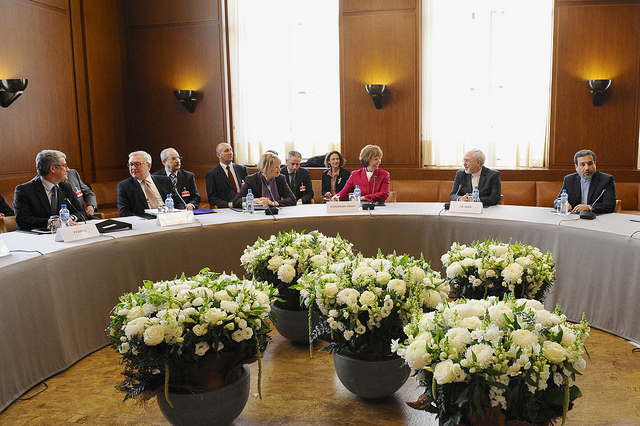
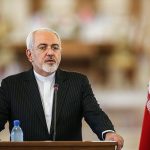
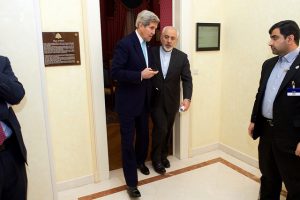
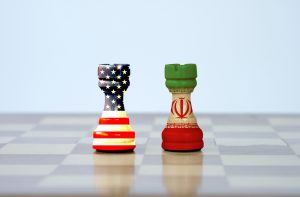
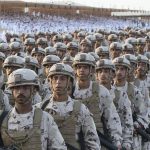
Carrying more water for Israel by the U.S. Senate, re: more sanctions, before any kind of compromise can be reached, is akin to sabotaging any U.S. effort[s] to resolve the Issues. More to the point, it makes the U.S. appear weak, because a foreign Government is calling the shots. Israel has gotten itself into the position it’s in, granted with the help of the U.S., But Israel isn’t paying for the war[s] with money or blood. Also, the U.S. can’t wait for the changes to occur on their own. A Nuclear free M.E. requires Israel to give up theirs too.